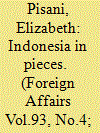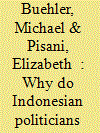|
|
|
Sort Order |
|
|
|
Items / Page
|
|
|
|
|
|
|
| Srl | Item |
| 1 |
ID:
132162


|
|
|
|
|
| Summary/Abstract |
In April, voters in Indonesia's parliamentary elections shocked many observers, confounded most pollsters, and seemed to set back their own long-term interests by failing to deliver a massive victory to the main opposition party, the Indonesian Democratic Party of Struggle. Under the country's complex electoral rules, a party must win 25 percent of the popular vote (or 20 percent of the seats in parliament) before it can formally nominate a presidential candidate. Polls had predicted that the Democratic Party of Struggle would win up to 30 percent of the vote, largely thanks to the massive popularity of the politician the party announced would represent it in the presidential election: Joko Widodo, the governor of Jakarta, who was expected to win that race handily. But his party managed to eke out only 19 percent -- more than any of the 11 other parties in the running, but not enough to cross the threshold. And so Jokowi, as he is widely known, will have to form a coalition to run for president, meaning that if he manages to take the helm of the world's third-largest democracy in July, he'll do so with little power and representing an alliance with no clear platform.
|
|
|
|
|
|
|
|
|
|
|
|
|
|
|
|
| 2 |
ID:
151521


|
|
|
|
|
| Summary/Abstract |
Taking the discussion in the existing literature on the adoption of shari’a laws in democratising Muslim-majority countries as a starting point, we posit that there are two broad motivations for democratically-elected politicians to adopt shari’a laws and regulations: ideological conviction on the one hand and response to the expressed or perceived preference of constituents on the other hand. The ‘demand side’ can be further divided into the preferences of individual voters, and the interests of groups which act as power brokers, influencing the voting choices of individual citizens. These groups may be economic, religious, or other actors. These motivations are not mutually exclusive; the passage of a given shari’a regulation may fulfil two or all three of them simultaneously. However, we posit that the interaction between the place, timing, and content of shari’a laws passed in a nation as a whole will vary in various predictable ways, according to the dominant motivations. The dominant motivation may also affect the vigour with which the law is implemented.
|
|
|
|
|
|
|
|
|
|
|
|
|
|
|
|
|
|
|
|
|